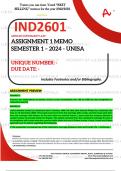Tutors you can trust. Voted “BEST
SELLING” memos for the year 2022/2023.
IND2601
AFRICAN CUSTOMARY LAW
ASSIGNMENT 1 MEMO
SEMESTER 1 – 2024 - UNISA
UNIQUE NUMBER: -
DUE DATE: -
Includes Footnotes and/or Bibliography.
ASSIGNMENT PREVIEW
Question 1
Discuss the Implications of section 211(3) of the Constitution Act 108 of 1996 for the recognition of
customary law [12]
Question 2
Liema married Lerato by customary law in January 1999. He later also married Palesa by customary law
rites on 10 December 2006. Three girls were born from the marriage with Lerato, and two boys were born
from the marriage with Palesa. At the time when he married Palesa, Liema used the property allotted to
Lerato’s house to provide lobolo for Palesa. The lobolo received from the customary marriage for one of
his daughters with Lerato was also used to settle lobolo for one of Palesa’s sons. Liema, Lerato and Palesa
approach you for advice regarding the following.
i) The proprietary consequences of the customary marriage between Liema and Lerato. (5).…continues…
Disclaimer
Extreme care has been used by our Tutors to draft this document, however the contents are provided “as is” without any representations
or warranties, express or implied. This document is to be used for comparison, research and reference purposes ONLY. No part of this
document may be reproduced, resold or transmitted in any form or by any means without prior written permission from the Author. –
LLB EXAMPACKS & TUTORIALS.
PAST PAPERS & MEMOS, ASSIGNMENT MEMOS, NOTES, SUMMARIES & TUITONS.
Cell: 062 810 8624 Email: llbexampacks@gmail.com
Fax: 086 096 5452 www.llbexampacksandtutorials.co.za
, Question 1
Discuss the Implications of section 211(3) of the Constitution Act 108 of 1996 for the
recognition of customary law [12]
Section 211(3) of the Constitution Act 108 of 1996 has important implications for the recognition
of customary law in South Africa. This section is particularly significant in promoting the equal
status and recognition of different legal systems within the constitutional framework. Here are the
implications: 1
1. Equality and Recognition of Customary Law:
- Section 211(3) emphasizes the equality of the different legal systems in South Africa,
recognizing both common law and customary law. It promotes the idea that no legal system
should be given preference over another. 2
2. Recognition of Customary Law as Part of South African Law:
- The provision explicitly recognizes customary law as a distinct and important component of
South African law. This acknowledgment is vital in fostering cultural diversity and ensuring
that the legal system respects and reflects the traditions and customs of various
communities. 3
3. Protection of Customary Law Principles:
- Section 211(3) safeguards the principles of customary law from being undermined or
overlooked. It serves as a constitutional guarantee that customary law will be respected and
taken into account within the broader legal framework. 4
1
African Customary Law in South Africa. Post-Apartheid and Living Law Perspectives by C. Himonga and T. Nhlapo,
T., (eds.). 2015. Cape Town: Oxford University Press Southern Africa.
2
African Customary Law in South Africa. Post-Apartheid and Living Law Perspectives by C. Himonga and T. Nhlapo,
T., (eds.). 2015. Cape Town: Oxford University Press Southern Africa.
3
African Customary Law in South Africa. Post-Apartheid and Living Law Perspectives by C. Himonga and T. Nhlapo,
T., (eds.). 2015. Cape Town: Oxford University Press Southern Africa.
4
African Customary Law in South Africa. Post-Apartheid and Living Law Perspectives by C. Himonga and T. Nhlapo,
T., (eds.). 2015. Cape Town: Oxford University Press Southern Africa.





